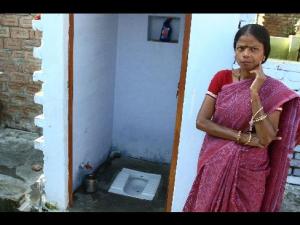 India Failing to Control Open Defecation Blunts Nation’s Growth, By Jason Gale
India Failing to Control Open Defecation Blunts Nation’s Growth, By Jason Gale
March 4 (Bloomberg) — Until May 2007, Meera Devi rose before dawn each day and walked a half mile to a vegetable patch outside the village of Kachpura to find a secluded place.
Dodging leering men and stick-wielding farmers and avoiding spots that her neighbors had soiled, the mother of three pulled up her sari and defecated with the Taj Mahal in plain view.
With that act, she added to the estimated 100,000 tons of human excrement that Indians leave each day in fields of potatoes, carrots and spinach, on banks that line rivers used for drinking and bathing and along roads jammed with scooters, trucks and pedestrians. Devi looks back on her routine with pain and embarrassment.
“As a woman, I would have to check where the males were going to the toilet and then go in a different direction,” says Devi, 37, standing outside her one-room mud-brick home. “We used to avoid the daytimes, but if we were really pressured, we would have to go any time of the day, even if it was raining. During the harvest season, people would have sticks in the fields. If somebody had to go, people would beat them up or chase them.”
In the shadow of its new suburbs, torrid growth and 300- million-plus-strong middle class, India is struggling with a sanitation emergency. From the stream in Devi’s village to the nation’s holiest river, the Ganges, 75 percent of the country’s surface water is contaminated by human and agricultural waste and industrial effluent. Everyone in Indian cities is at risk of consuming human feces, if they’re not already, the Ministry of Urban Development concluded in September.
Economic Drain
Illness, lost productivity and other consequences of fouled water and inadequate sewage treatment trimmed 1.4-7.2 percent from the gross domestic product of Cambodia, Indonesia, the Philippines and Vietnam in 2005, according to a study last year by the World Bank’s Water and Sanitation Program.
Sanitation and hygiene-related issues may have a similar if not greater impact on India’s $1.2 trillion economy, says Guy Hutton, a senior water and sanitation economist with the program in Phnom Penh, Cambodia. Snarled transportation and unreliable power further damp the nation’s growth. Companies that locate in India pay hardship wages and ensconce employees in self- sufficient compounds.
The toll on human health is grim. Every day, 1,000 children younger than 5 years old die in India from diarrhea, hepatitis- causing pathogens and other sanitation-related diseases, according to the United Nations Children’s Fund.

As mentioned elsewhere, watch:
This is truly empowering women!